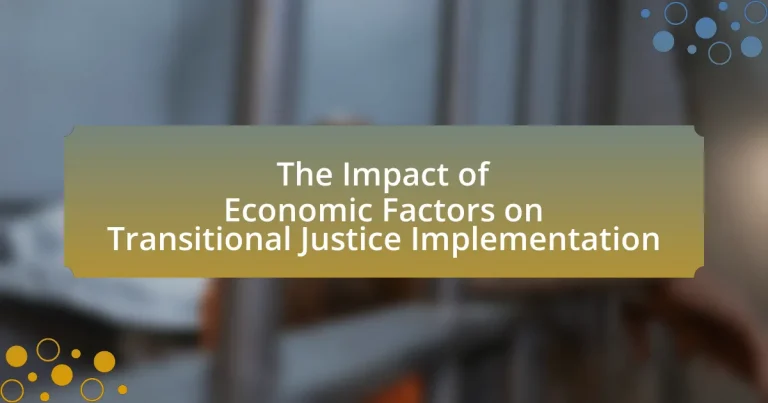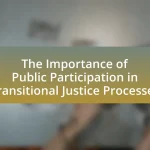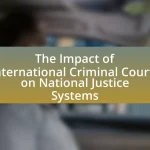The article examines the impact of economic factors on the implementation of transitional justice, highlighting how financial resources, economic stability, and development conditions influence the effectiveness and sustainability of justice initiatives following conflict or repression. It discusses the relationship between economic conditions and the success of transitional justice mechanisms, such as truth commissions and reparations, emphasizing the role of specific economic indicators like GDP growth and income inequality. The article also addresses the challenges faced in economically strained contexts, the consequences of underfunding, and strategies to overcome economic barriers, ultimately linking successful transitional justice to long-term economic recovery and stability.
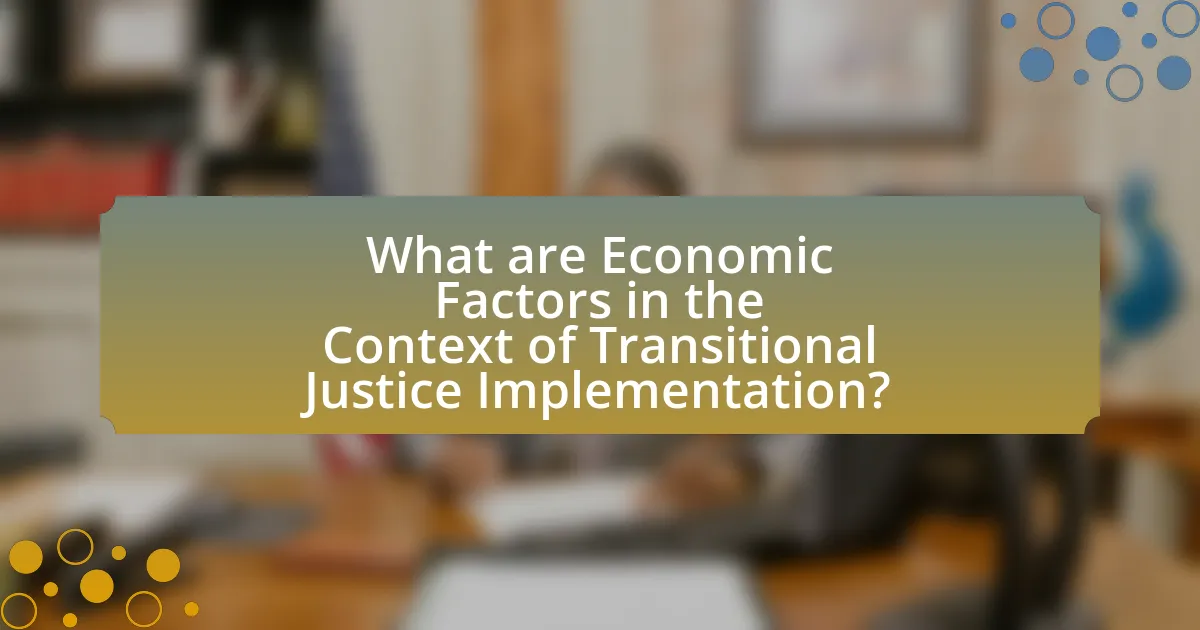
What are Economic Factors in the Context of Transitional Justice Implementation?
Economic factors in the context of transitional justice implementation refer to the financial resources, economic stability, and development conditions that influence the effectiveness and sustainability of justice initiatives following periods of conflict or repression. These factors can determine the availability of funding for programs such as truth commissions, reparations, and institutional reforms, which are essential for addressing past human rights violations. For instance, countries with stronger economies may allocate more resources to transitional justice efforts, while those facing economic challenges may struggle to implement necessary reforms, as seen in the case of post-apartheid South Africa, where economic considerations significantly shaped the Truth and Reconciliation Commission’s operations.
How do economic conditions influence the effectiveness of transitional justice?
Economic conditions significantly influence the effectiveness of transitional justice by affecting resource availability, public support, and institutional capacity. In contexts where economic stability is low, governments may lack the financial resources necessary to implement justice mechanisms effectively, such as courts or reparations programs. For instance, countries like Sierra Leone and Liberia, which faced severe economic challenges post-conflict, struggled to establish robust transitional justice systems, leading to limited accountability and public trust. Furthermore, economic hardship can diminish public support for transitional justice initiatives, as citizens prioritize immediate economic needs over justice processes. This was evident in post-apartheid South Africa, where economic disparities influenced perceptions of the Truth and Reconciliation Commission’s effectiveness. Thus, the interplay between economic conditions and transitional justice is critical, as financial constraints and public sentiment directly impact the success of justice initiatives.
What specific economic indicators are relevant to transitional justice?
Specific economic indicators relevant to transitional justice include GDP growth rate, unemployment rate, income inequality (measured by the Gini coefficient), and levels of foreign direct investment (FDI). These indicators provide insights into the economic stability and development of a country undergoing transitional justice processes. For instance, a high unemployment rate can exacerbate social tensions, making the implementation of transitional justice more challenging. Additionally, income inequality can influence public perceptions of fairness and justice, impacting the legitimacy of transitional justice initiatives. Studies have shown that countries with higher GDP growth and lower inequality tend to have more successful transitional justice outcomes, as economic stability fosters an environment conducive to reconciliation and rebuilding trust in institutions.
How do economic resources impact the implementation of transitional justice mechanisms?
Economic resources significantly influence the implementation of transitional justice mechanisms by determining the availability of funding, personnel, and infrastructure necessary for effective operations. For instance, countries with limited economic resources often struggle to establish comprehensive transitional justice processes, as seen in the case of post-conflict nations like Liberia, where insufficient funding hindered the Truth and Reconciliation Commission’s ability to carry out its mandate fully. Additionally, economic constraints can lead to prioritization of immediate economic recovery over long-term justice initiatives, impacting the overall effectiveness and sustainability of transitional justice efforts.
Why is understanding economic factors crucial for transitional justice?
Understanding economic factors is crucial for transitional justice because they directly influence the feasibility and effectiveness of justice initiatives. Economic conditions can determine the availability of resources for implementing justice mechanisms, such as courts and reparations programs. For instance, countries with limited economic resources may struggle to fund comprehensive transitional justice processes, leading to inadequate responses to past atrocities. Additionally, economic disparities can exacerbate social tensions, making it essential to address these factors to foster stability and reconciliation. Research indicates that successful transitional justice efforts often correlate with robust economic support, as seen in post-apartheid South Africa, where economic growth facilitated the Truth and Reconciliation Commission’s work.
What role do economic disparities play in shaping public perception of justice?
Economic disparities significantly influence public perception of justice by creating a divide in how different socioeconomic groups experience and interpret legal systems. Individuals from lower economic backgrounds often perceive the justice system as biased and inaccessible, leading to feelings of disenfranchisement. For instance, a study by the Pew Research Center found that 70% of low-income individuals believe that the legal system favors the wealthy, highlighting a widespread sentiment that economic status directly affects justice outcomes. This perception is further reinforced by disparities in legal representation, where affluent individuals can afford better legal counsel, resulting in unequal treatment in court. Consequently, economic disparities shape not only individual experiences but also collective beliefs about the fairness and effectiveness of justice systems.
How can economic stability affect the political will for transitional justice?
Economic stability significantly enhances the political will for transitional justice by creating an environment conducive to reform and accountability. When a country experiences economic stability, it often leads to increased public trust in government institutions, which can motivate political leaders to pursue transitional justice measures. For instance, stable economies can allocate resources towards legal frameworks and reparations for victims, as seen in post-apartheid South Africa, where economic growth allowed for the establishment of the Truth and Reconciliation Commission. Furthermore, economic stability reduces the urgency for political leaders to prioritize short-term gains over long-term justice, enabling them to focus on addressing past human rights violations. This correlation is supported by research indicating that countries with stronger economic performance are more likely to implement effective transitional justice mechanisms, as they possess the necessary resources and public support to do so.
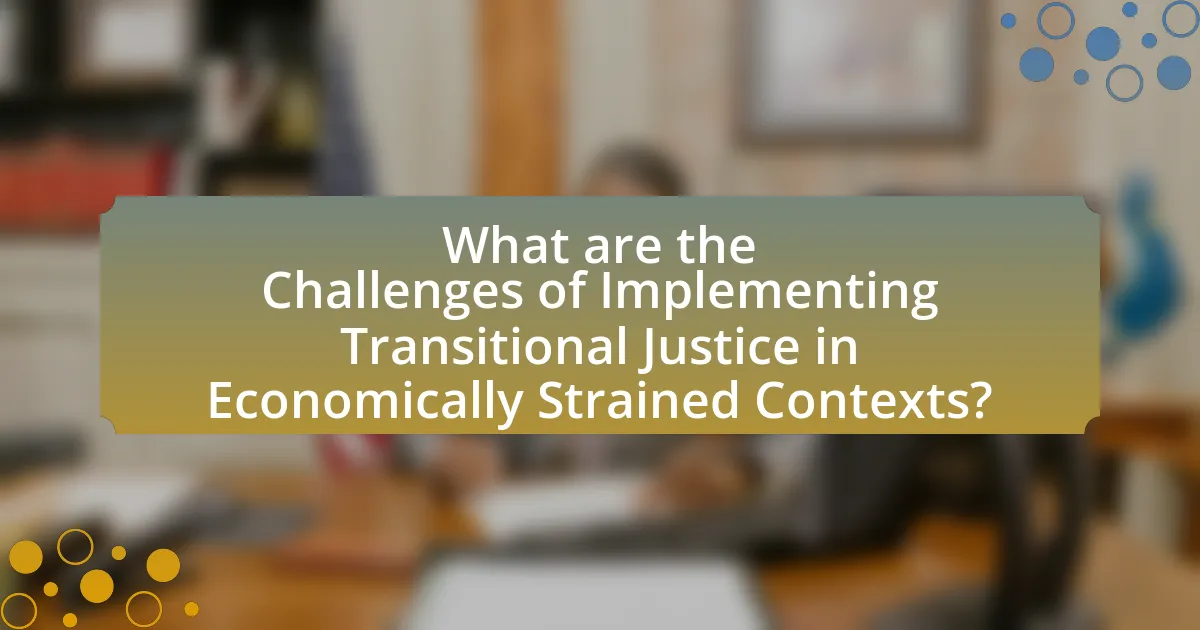
What are the Challenges of Implementing Transitional Justice in Economically Strained Contexts?
Implementing transitional justice in economically strained contexts faces significant challenges, primarily due to limited financial resources, which hinder the establishment and maintenance of necessary institutions. Economic constraints often lead to prioritization of immediate economic recovery over long-term justice initiatives, resulting in inadequate funding for truth commissions, reparations, and judicial processes. For instance, countries like Haiti and Zimbabwe have struggled to implement comprehensive transitional justice measures due to ongoing economic crises, which divert attention and resources away from justice efforts. Additionally, the lack of economic stability can exacerbate social tensions, making it difficult to foster the necessary public support for transitional justice initiatives.
How do limited financial resources hinder transitional justice processes?
Limited financial resources significantly hinder transitional justice processes by restricting the ability to implement necessary programs and initiatives. Insufficient funding can lead to inadequate investigations, limited outreach to affected communities, and insufficient support for victims seeking justice. For instance, the International Center for Transitional Justice has noted that many countries transitioning from conflict or authoritarian rule struggle to allocate sufficient budgets for truth commissions and reparations, which are essential components of transitional justice. This financial constraint often results in incomplete or ineffective processes, undermining the overall goals of accountability and reconciliation.
What are the consequences of underfunding transitional justice initiatives?
Underfunding transitional justice initiatives leads to inadequate accountability for human rights violations, resulting in a lack of justice for victims. This financial shortfall often hampers the establishment of effective legal frameworks and institutions necessary for addressing past atrocities. For instance, in countries like Guatemala, insufficient funding has delayed trials and weakened the capacity of truth commissions, ultimately perpetuating a culture of impunity. Additionally, underfunding can diminish public trust in the justice system, as communities may perceive the lack of resources as a sign that their grievances are not taken seriously. This erosion of trust can further destabilize societies recovering from conflict, as seen in post-apartheid South Africa, where financial constraints limited the effectiveness of the Truth and Reconciliation Commission.
How can economic crises exacerbate human rights violations during transitions?
Economic crises can exacerbate human rights violations during transitions by creating instability that undermines legal and institutional frameworks designed to protect rights. During economic downturns, governments may prioritize austerity measures, leading to cuts in social services and law enforcement, which can result in increased violence, discrimination, and repression against marginalized groups. For instance, the 2008 global financial crisis led to widespread protests and civil unrest, where governments in various countries responded with excessive force, violating the rights to assembly and free expression. Additionally, economic hardship can foster environments where corruption and impunity thrive, further eroding accountability mechanisms essential for safeguarding human rights.
What strategies can be employed to overcome economic barriers in transitional justice?
To overcome economic barriers in transitional justice, strategies such as international funding, community-based reparations, and economic empowerment programs can be employed. International funding can provide necessary resources for transitional justice initiatives, as seen in post-conflict countries like Sierra Leone, where external financial support facilitated the establishment of the Truth and Reconciliation Commission. Community-based reparations can ensure that resources are distributed equitably, allowing affected communities to participate actively in the process, which has been effective in Colombia’s peace process. Economic empowerment programs, such as vocational training and microfinance initiatives, can help rebuild livelihoods and foster social cohesion, as demonstrated by programs in Rwanda following the genocide. These strategies collectively address the economic constraints that often hinder the implementation of transitional justice.
How can international financial support enhance transitional justice efforts?
International financial support can enhance transitional justice efforts by providing necessary resources for implementing justice mechanisms, such as truth commissions, reparations programs, and legal reforms. For instance, funding from international organizations has been crucial in countries like South Africa and Rwanda, where financial assistance facilitated the establishment of the Truth and Reconciliation Commission and the Gacaca courts, respectively. These mechanisms require substantial financial investment to operate effectively, ensuring that victims receive justice and that societal healing can occur. Additionally, financial support can help build local capacities, train personnel, and promote public awareness, which are essential for the sustainability of transitional justice initiatives.
What role do local economies play in sustaining transitional justice initiatives?
Local economies are crucial in sustaining transitional justice initiatives by providing the necessary resources and support for their implementation. Economic stability fosters community engagement and participation, which are essential for the legitimacy and effectiveness of transitional justice processes. For instance, in post-conflict societies, local economic activities can generate employment opportunities that help rebuild trust and social cohesion, thereby facilitating the acceptance of transitional justice measures. Additionally, studies have shown that regions with stronger local economies tend to have higher rates of successful transitional justice outcomes, as economic incentives can motivate communities to engage with and support these initiatives.
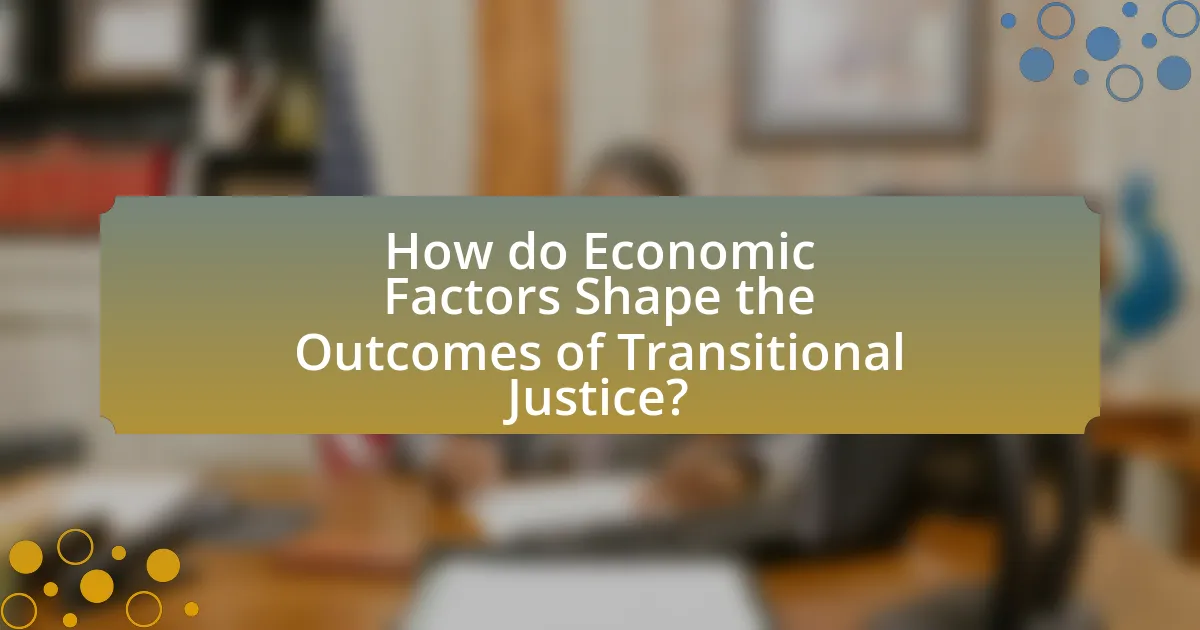
How do Economic Factors Shape the Outcomes of Transitional Justice?
Economic factors significantly shape the outcomes of transitional justice by influencing resource allocation, public support, and the overall stability of post-conflict societies. For instance, countries with stronger economies can allocate more resources to reparations, institutional reforms, and legal processes, which enhances the effectiveness of transitional justice mechanisms. Conversely, nations facing economic hardship may struggle to implement these measures, leading to incomplete or ineffective justice processes. A study by the United Nations Development Programme highlights that economic stability is crucial for fostering trust in transitional justice systems, as it allows for the necessary investments in infrastructure and capacity-building. Thus, the economic context directly impacts the success and legitimacy of transitional justice initiatives.
What are the long-term economic impacts of successful transitional justice implementation?
Successful transitional justice implementation can lead to long-term economic stability and growth. By addressing past injustices and fostering reconciliation, countries can create a more conducive environment for investment and economic development. For instance, research indicates that nations with effective transitional justice mechanisms experience a reduction in conflict-related violence, which in turn enhances investor confidence and promotes economic activities. Additionally, the establishment of rule of law and accountability can improve governance, leading to better resource management and economic policies. Historical examples, such as South Africa post-apartheid, demonstrate that successful transitional justice can result in increased foreign direct investment and economic diversification, ultimately contributing to sustained economic growth.
How does transitional justice contribute to economic recovery in post-conflict societies?
Transitional justice contributes to economic recovery in post-conflict societies by establishing accountability, fostering social cohesion, and rebuilding trust in institutions. By addressing past human rights violations, transitional justice mechanisms, such as truth commissions and reparations, create a sense of justice that can stabilize societies and encourage investment. For instance, the post-apartheid South African Truth and Reconciliation Commission facilitated national healing and economic growth by promoting reconciliation, which led to increased foreign investment. Additionally, transitional justice can help restore property rights and provide reparations, which directly supports economic revitalization. Studies have shown that societies that implement transitional justice measures experience more robust economic recovery compared to those that do not, as seen in the cases of Rwanda and Sierra Leone, where justice initiatives were linked to improved economic conditions post-conflict.
What evidence exists linking transitional justice to economic development?
Transitional justice is linked to economic development through mechanisms that promote stability, accountability, and social cohesion. Evidence shows that countries implementing transitional justice measures, such as truth commissions and reparations, often experience improved economic conditions post-conflict. For instance, a study by the World Bank indicates that nations with effective transitional justice frameworks tend to attract more foreign investment, as these frameworks signal a commitment to rule of law and human rights. Additionally, research published in the Journal of Peace Research highlights that societies addressing past injustices through transitional justice are more likely to achieve sustainable economic growth, as they foster trust among citizens and reduce the likelihood of future conflicts.
How can lessons from economic factors inform future transitional justice efforts?
Lessons from economic factors can inform future transitional justice efforts by highlighting the importance of resource allocation and economic stability in fostering social cohesion and rebuilding trust in post-conflict societies. Economic analysis reveals that countries with stronger economic foundations tend to have more successful transitional justice processes, as seen in South Africa, where economic growth post-apartheid facilitated reconciliation efforts. Additionally, understanding the economic grievances that contribute to conflict can guide the design of justice mechanisms that address these underlying issues, ensuring that reparations and restorative measures are effectively targeted. For instance, the International Monetary Fund has noted that inclusive economic policies can reduce the likelihood of conflict recurrence, emphasizing the need for transitional justice frameworks to incorporate economic considerations to enhance their effectiveness and sustainability.
What best practices can be derived from successful case studies?
Best practices derived from successful case studies in transitional justice implementation include prioritizing community engagement, ensuring inclusive participation, and integrating economic considerations into the justice process. Community engagement fosters trust and ownership, as seen in South Africa’s Truth and Reconciliation Commission, which involved victims and communities in the dialogue process. Inclusive participation, exemplified by the peace agreements in Colombia, ensures that marginalized groups have a voice, leading to more comprehensive and accepted outcomes. Additionally, integrating economic factors, as demonstrated in post-conflict reconstruction efforts in Rwanda, highlights the importance of addressing economic grievances to achieve sustainable peace and justice. These practices collectively enhance the effectiveness and legitimacy of transitional justice initiatives.
How can policymakers integrate economic considerations into transitional justice frameworks?
Policymakers can integrate economic considerations into transitional justice frameworks by incorporating economic reparations and development programs that address the needs of affected communities. This approach ensures that justice is not only about accountability but also about restoring livelihoods and promoting economic stability. For instance, countries like South Africa have included economic reparations in their Truth and Reconciliation Commission, which provided financial compensation to victims of apartheid, thereby linking justice with economic recovery. Additionally, integrating economic assessments into the planning stages of transitional justice initiatives can help identify resource allocation and funding needs, ensuring that economic factors are prioritized in the implementation process.
What practical steps can be taken to enhance the relationship between economic factors and transitional justice?
To enhance the relationship between economic factors and transitional justice, integrating economic assessments into transitional justice frameworks is essential. This can be achieved by conducting thorough economic impact analyses to understand how justice initiatives affect local economies and livelihoods. For instance, the International Center for Transitional Justice emphasizes the importance of economic reparations, which can provide financial support to victims while stimulating local economies. Additionally, fostering partnerships between transitional justice institutions and economic development agencies can ensure that justice processes are aligned with economic recovery efforts, as seen in post-conflict countries like Rwanda, where economic growth has been linked to successful transitional justice measures. Implementing these steps can create a synergistic relationship that promotes both justice and economic stability.
